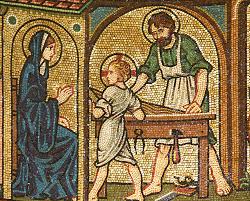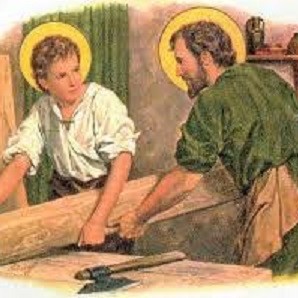March 19th, St Joseph - and Pope Francis has proclaimed “Year of St Joseph”
A collection of different images of Joseph - perhaps a resource for offering something on him in his year. More on May 1st, St Joseph the Worker.
With the Apostolic Letter “Patris corde” (“With a Father’s Heart”), Pope Francis recalls the 150th anniversary of the declaration of Saint Joseph as Patron of the Universal Church. To mark the occasion, the Holy Father has proclaimed a “Year of Saint Joseph” from today, 8 December 2020, to 8 December 2021.
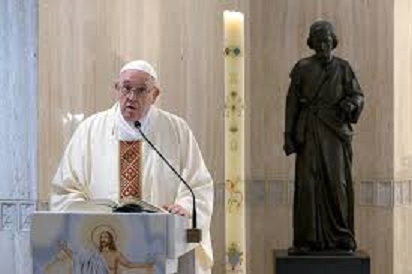
Pope Francis describes Saint Joseph as a beloved father, a tender and loving father, an obedient father, an accepting father; a father who is creatively courageous, a working father, a father in the shadows.
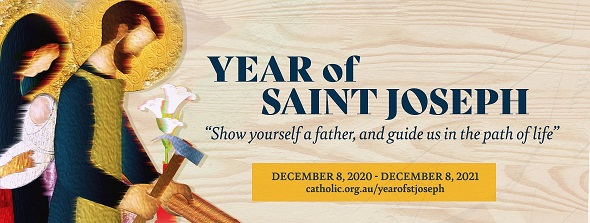
A beloved, tender, obedient father
Saint Joseph, in fact, “concretely expressed his fatherhood” by making an offering of himself in love “a love placed at the service of the Messiah who was growing to maturity in his home,” quoting his predecessor Paul VI.
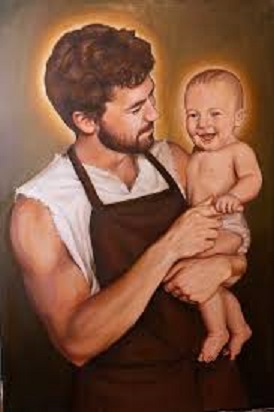
Welcoming the will of God
At the same time, Joseph is “an accepting Father,” because he “accepted Mary unconditionally” — an important gesture even today, says Pope Francis, “in our world where psychological, verbal and physical violence towards women is so evident.” But the Bridegroom of Mary is also the one who, trusting in the Lord, accepts in his life even the events that he does not understand, “setting aside his own ideas” and reconciling himself with his own history.
Joseph’s spiritual path “is not one that explains, but accepts” — which does not mean that he is “resigned.” Instead, he is “courageously and firmly proactive,” because with “Holy Spirit’s gift of fortitude,” and full of hope, he is able “to accept life as it is, with all its contradictions, frustrations and disappointments.” In practice, through St. Joseph, it is as if God were to repeat to us: “Do not be afraid!” because “faith gives meaning to every event, however happy or sad,” and makes us aware that “God can make flowers spring up from stony ground.” Joseph “did not look for shortcuts but confronted reality with open eyes and accepted personal responsibility for it.” For this reason, “he encourages us to accept and welcome others as they are, without exception, and to show special concern for the weak”.
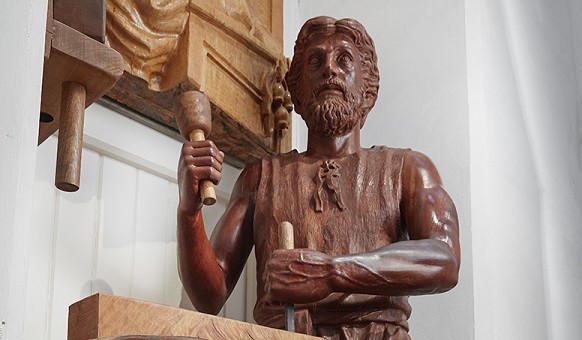
A creatively courageous father, example of love
“the creative courage” of St. Joseph, which “emerges especially in the way we deal with difficulties.” “The carpenter of Nazareth,” explains the Pope, was able to turn a problem into a possibility by trusting in divine providence.” He had to deal with “the concrete problems” his Family faced, problems faced by other families in the world, and especially those of migrants.
In this sense, St. Joseph is “the special patron of all those forced to leave their native lands because of war, hatred, persecution and poverty.” As the guardian of Jesus and Mary, Joseph cannot “be other than the guardian of the Church,” of her motherhood, and of the Body of Christ. “Consequently, every poor, needy, suffering or dying person, every stranger, every prisoner, every infirm person is ‘the child’ whom Joseph continues to protect.”
![]()
A father who teaches the value, dignity and joy of work
“A carpenter who earned an honest living to provide for his family,” St Joseph also teaches us “the value, the dignity and the joy of what it means to eat bread that is the fruit of one’s own labour.”, in favour of work, which has become “a burning social issue” even in countries with a certain level of well-being. “there is a renewed need to appreciate the importance of dignified work, of which Saint Joseph is an exemplary patron,”
Pope Francis encourages everyone “to rediscover the value, the importance and the necessity of work for bringing about a new ‘normal’ from which no one is excluded.” Especially in light of rising unemployment due to the Covid-19 pandemic, the Pope calls everyone to “review our priorities” and to express our firm conviction that no young person, no person at all, no family should be without work!”
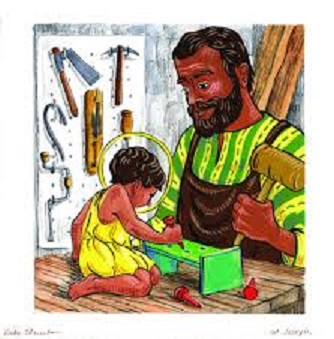
A father “in the shadows,” centred on Mary and Jesus
Taking a cue from The Shadow of the Father — a book by Polish writer Jan Dobraczyński — Pope Francis describes Joseph’s fatherhood of Jesus as “the earthly shadow of the heavenly Father.”
“Fathers are not born, but made,” says Pope Francis. “A man does not become a father simply by bringing a child into the world, but by taking up the responsibility to care for that child.” Unfortunately, in today’s society, children “often seem orphans, lacking fathers” who are able to introduce them “to life and reality.” Children, the Pope says, need fathers who will not try to dominate them, but instead raise them to be “capable of deciding for themselves, enjoying freedom and exploring new possibilities.”
True fathers “refuse to live the lives of their children for them,” and instead respect their freedom. In this sense, says Pope Francis, a father realizes that “he is most a father and an educator at the point when he becomes ‘useless,’ when he sees that his child has become independent and can walk the paths of life unaccompanied.”
